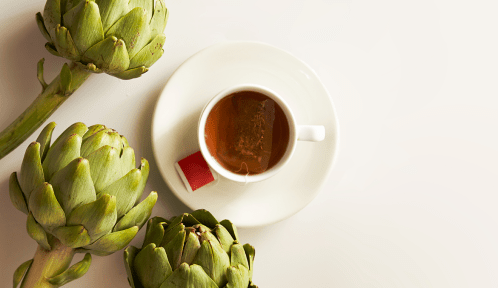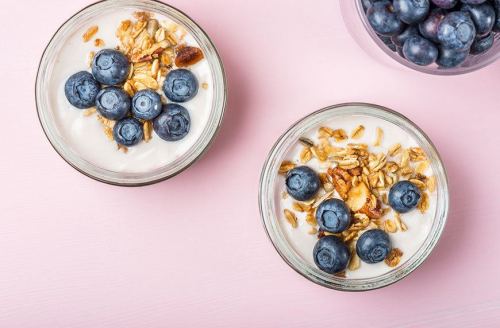Our editors independently select these products. Making a purchase through our links may earn Well+Good a commission
Some people are true herbal tea devotees who can rattle off the good-for-you benefits of green tea, chamomile tea, red raspberry leaf tea, peppermint tea, thyme tea, ginger tea, and beyond. While I’m certainly no tea sommelier, I have become better acquainted with certain brews while on the hunt for coffee alternatives.
Experts in This Article
registered dietitian and owner of BZ Nutrition
Lavender tea is my new mainstay and butterfly pea flower tea always feels like a nice treat, but, more importantly, drinking these vitamin-rich herbal options has truly become a soul-soothing habit of mine. That said, when the concept of artichoke tea first popped on my radar, I have to admit that I was more confused than intrigued. What unholy marriage between antipasto and wellness beverage is this?
As it turns out, the new-to-me tea isn’t new at all. A longtime popular drink in Vietnamese culture known as trà atiso, the flavor of artichoke tea is reported to be smooth and naturally sweet. That is to say that you absolutely shouldn’t expect it to taste like the drained pickled liquid from a jar of artichoke hearts, nor artichoke dip, for that matter.
Curious to learn more about artichoke tea, how to make it, and the benefits it offers? Below, we unpack everything to consider before adding it to your regular roster.
What is artichoke tea?
Artichoke tea is exactly what it sounds like, and you can probably guess how to make it, as well. “Artichoke tea is tea made from boiling artichoke leaves in water and letting it steep,” says Brigitte Zeitlin, RD, registered dietitian and owner of BZ Nutrition. “You can make your own, or buy the tea bags. While this may sound like ‘new’ tea, the drink has long been a staple in Vietnamese culture,” Zeitlin says.
So, if you’re keen on DIY our artichoke brew, you can easily go online and order a few boxes. This natural artichoke tea two-pack ($9) will keep you stocked for a while, or this Jerusalem artichoke tea ($15) could also be a good option.
6 artichoke tea benefits
1. It’s packed with essential nutrients
When it comes to tea, artichoke tea is a great option that contains a boatload of nutrients and benefits. For starters, it’s loaded with tons of essential vitamins and minerals. “Artichokes are a total super food, and are loaded in nutrients like vitamins A, C, and Thiamine (B1) plus minerals like magnesium, calcium, iron, and zinc,” Zeitlin says. “By boiling the artichoke leaves, the water—that is, the tea—will become infused with some of the powerful nutrients and antioxidants of the artichoke.”
“By boiling the artichoke leaves, the water—that is, the tea—will become infused with some of the powerful nutrients and antioxidants of the artichoke.” —Brigitte Zeitlin, RD
So, think of this as a powerful way to distill the nutrients of the artichoke, then glean some of the following benefits of drinking up. A win-win.
2. It can potentially help boost immunity
Zeitlin points out that thanks to vitamin C and antioxidants in artichoke tea, the drink can help with strengthening your immunity. That’s not to say it’s a cure-all by any means (as in, don’t abandon any of your other immunity-boosting habits in favor of sipping this tea), but who couldn’t use a little boost like that right now?
3. It can potentially help relieve stress and anxiety
Much like other calming teas like chamomile and lavender, artichoke tea can help you unwind, too. (And, it’s not just because of that simple act of being present and unwinding with a cup of tea, either.) According to Zeitlin, artichoke tea also has calming prosperities thanks to its magnesium, zinc, and potassium content.
4. It might be able to lower your overall cholesterol levels
Emphasis on “might,” because while there haven’t been any direct studies on artichoke tea and cholesterol levels, there have been studies on the relationship between artichoke and cholesterol. Past research has pointed out that participants who consumed artichoke leaf extract daily found a decrease in both total and LDL cholesterol over time, which, of course, can lead to better cardiovascular health.
5. It might be excellent for your skin
Another perk of drinking artichoke tea? It might be great for your skin health. This is basically due to the high concentration of antioxidants, but research also suggests that artichoke polyphenols produce potentially anti-aging effects for your skin. It’s worth a shot, right?
6. The tea is certainly a less messy way to get the benefits of artichokes
While you can buy artichokes in jars and throw them into your salad, they come with a particularly chewy consistency and can be sort of a… journey to digest. When my mother prepares artichoke hearts, for example, she dolls them up with breadcrumbs, oils, and seasoning because I just don’t love how they taste plain. The good news? Artichoke tea also helps cut out the middle man of extra trimmings.
Of course, artichoke tea isn’t for everyone, and the mere thought of it can be off-putting for some. However, it’s a quick and effective way to make the most of your ‘chokes (and bang for your buck) with some added health benefits.”If eating artichokes aren’t your thing, then drinking their tea can be a great way to reap these benefits,” Zeitlin says. “It can also help reach your hydration goals for the day.”
What is artichoke tea good for?
In general, drinking this herbal tea is pretty harmless, but you should keep in mind that you do lose certain values artichokes can offer you by not eating the full vegetable to make some sort of delicious artichoke recipe, like an easy lunch salad.
That said, the veggie has tons of overall benefits. “One huge health booster of artichokes, though, is the amount of fiber they have in them, which you do not get from drinking the tea. You only get it from chewing—read: eating!—the vegetable. Fiber helps to lower cholesterol, promote motility, ward off bloat and gas, and help maintain an overall healthy digestive system. So drink the tea, but also, eat the whole ‘choke.” (And if you’re me, that means you’ll need a lot of breadcrumbs, oil, and seasonings at the ready.)
That said, it’s important to note that there isn’t much we know about the true benefits of artichoke tea that’s researched-based, at least not yet. “There are no clinical side effects yet distinguished from drinking artichoke tea, but there is also very little research specifically on artichoke tea,” says Zeitlin.
Who should not take artichoke?
The good news is that artichoke allergies are extremely rare, meaning that most folks can consume artichoke (and artichoke tea) with no problem. Although, like with any other foods, it’s important to start off slowly, or speak with a healthcare professional if you may have concerns regarding whether or not this drink is right for you. And, again, artichoke is harmless, at least in most cases. This also goes for drug interactions; most folks can consume artichoke without worrying about potential interference with their medications.
Pro tip: If sipping on artichoke tea isn’t exactly your cup of tea (pun intended), you can try infusing the tea with other ingredients, such as hibiscus, which can potentially help mask its flavor, while adding an extra boost of hydration and benefits.
Tasty tea recipe that’ll help you wind down for the day:
Sign Up for Our Daily Newsletter
Get all the latest in wellness, trends, food, fitness, beauty, and more delivered right to your inbox.
Got it, you've been added to our email list.










